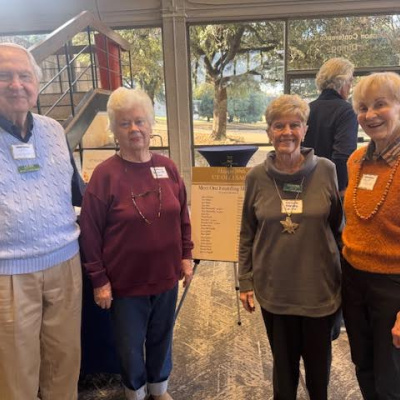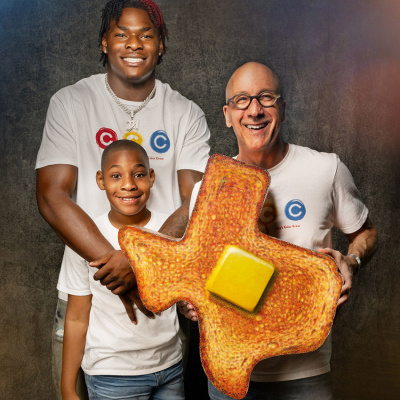One Man's Plan to Return to UT and Finish His Degree 44 Years Later

Walk down the Drag on any given afternoon, and you’ll likely see David Carter. Most people who frequent the area know Carter, who has experienced homelessness on and off for the last few decades, as a scruffy fixture on the corner of 24th and Guadalupe, where he spends most of his days panhandling.
But in the last few months, Carter has garnered some unexpected attention following a tweet from journalism and government sophomore Ryan Chandler, who interviewed him for a class assignment on homelessness in Austin. “This is the most important story I’ve ever written,” the tweet reads. “Many Longhorns know this man as the panhandler on the Drag. I know him as David Richard Carter—a Longhorn with 102 credit hours just waiting for a second chance. Hopefully, now, we all will.”
From there, Chandler made it his personal mission to help Carter achieve his dream. Over the past few months, Chandler has helped Carter secure his transcripts and set up meetings with the Office of Admissions. The Registrar’s Office confirmed Carter has only completed 87 hours of credit (not 102 like Chandler originally thought) toward a studio art degree, meaning he has roughly a semester to go. The College of Fine Arts has agreed to place Carter with an advisor to find his best path to a degree and determine tuition fees, which he hopes to afford through a Pell Grant. And the university has agreed to waive Carter’s application fee, something that stopped him from re-applying years prior.
Carter is one of about 12,000 people in Austin who experience some form of homelessness yearly, according to local nonprofit Front Steps. In one of the country’s fastest growing cities, the Austin-American Statesman reports that there are nearly 700 people without a place to sleep every night.
“I’ve always been bothered by how UT students see the homeless people on the Drag,” says Chandler, who worked with the Houston-based nonprofit A Simple Thread in high school, giving basic necessities to homeless communities. He created a similar organization called Horns for the Homeless in Austin last year. “They’re not criminals, or mean, or dangerous. I think David is the perfect representation of that. He’s a Longhorn, too, who has faced some struggles outside of his control.”

When I meet Carter on his usual corner, he greets me warmly. We stop into the 7-11 to grab him a Dr Pepper and the cashiers greet him by name. I ask what he makes of the attention his story’s been receiving, but he doesn’t seem aware that people are talking about him. Returning to school is just something he needs to do for himself. “It’s part of my bucket list,” says the 65-year-old Austin native. “It’s too late in life for some things—but this is something I can get done.”
As we cross the light to the University Methodist Church to sit down, he warns me that his memory can be faulty—“that’s what happens when you’ve lived like me,” he says tapping on his head.
And it’s true that it can be hard to keep up with him as he speaks. He jumps around from story to story, and forgets what years certain events happened. But it’s also difficult because of his sharp and literary mind: he assumes I know every artist, author, and historical event he casually drops into conversation, almost as if he doesn’t realize how extraordinarily well-read he is. He keeps a notebook in his shirt pocket at all times, “because you never know when inspiration will strike,” he says.
Had life been different, Carter would have been an artist. When he arrived at UT in 1971, he was a studio art major, with an artist mother who worked as a commercial illustrator.
But during his senior year, toward the beginning of his lifelong struggle with alcoholism, he severely damaged his hand, punching a glass window in a drunken rage. Carter lost his ability to draw, and all motivation along with it.
He dropped out of school, and though he couldn’t tell me exactly what happened next, he moved around and worked odd jobs. He was diagnosed with schizophrenia, and spent many stints in out of psychiatric hospitals, eventually falling into drug abuse. When his parents died around the time he was 40 they had disinherited him, and his sister had cut all ties.
It was only about six years ago, when he received help from Caritas of Austin, a nonprofit that aims to end homelessness, that Carter started getting his life in order. Now he lives in Arbor Terrace, an affordable housing community in South Austin, where he’s responsible for a portion of rent. He’s been working on his sobriety the last few years, and takes work where he can find it, sometimes as a dishwasher, when he’s not panhandling. And he goes to the PCL as often as possible to study art history and classic literature.
“He is a very passionate academic,” Chandler says. “But he doesn’t have the resources to really work on things. A degree and support from the university could really change that.”
Carter’s return to school likely won’t be an easy one. Aside from his struggle with his mental health, money will be an issue. Chandler plans to set up a GoFundMe for Carter once they determine the costs of tuition. They remain optimistic that by 2020, Carter will be back in school.
Before Carter and I part ways, I ask him what he hopes to do once he graduates. “My dream is to write a great novel. I’ve been writing for 30 years now,” Carter says. “I want to be sure I make a contribution to posterity.”
Credit: Ann Mark Photo






